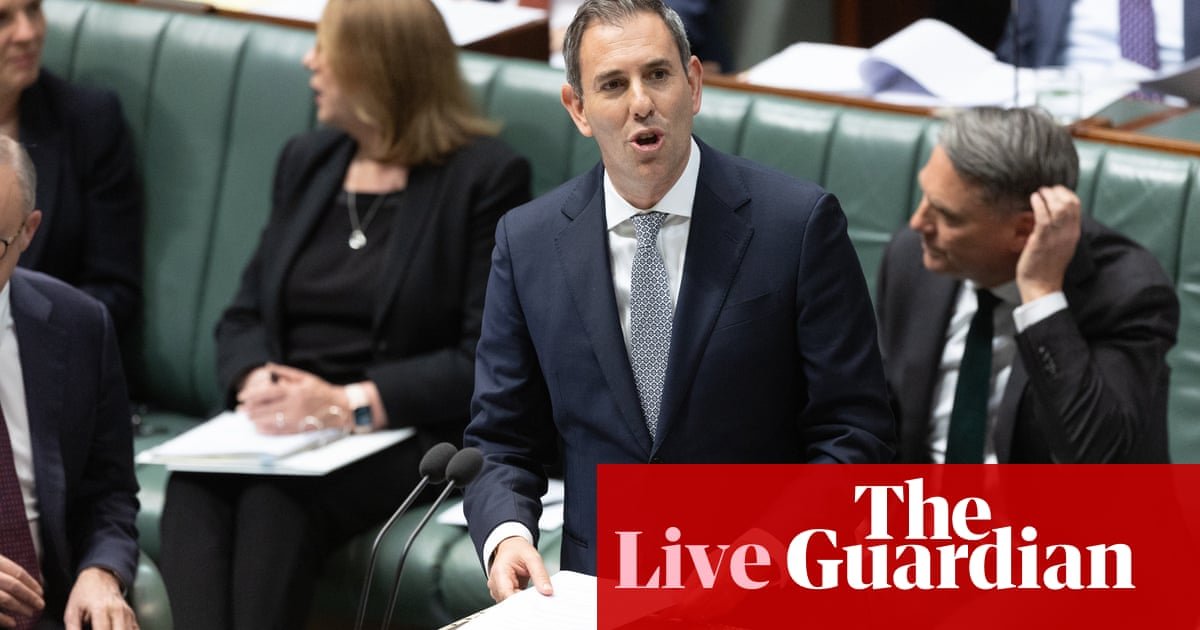Iron ore price slump could cost federal budget $3bn over four years

Paul Karp
The treasurer, Jim Chalmers, has released analysis from Treasury that lower than expected iron ore prices could cost the federal budget $3bn over four years.
Iron ore prices have fallen 38% since the beginning of 2024, including 7.5% in the last week alone, with prices reaching their lowest level since November 2022 on 15 August 2024.
At close of trade on Thursday, the iron ore price was US$81.80 a tonne, below the US$83/tonne that the Treasury had assumed it would currently be.
The Treasury assumed that the iron ore price would decline from its level around the time of budget to reach its long-run anchor price of US$60/tonne by the end of the March quarter 2025. The $3bn estimate is based on if this price is reached instead by the end of the September quarter 2024.
Chalmers said:
Softness in the Chinese economy and the recent fall in iron ore prices are another reminder that we are not immune from volatility and uncertainty in the global economy. This is exactly why we take such a cautious and conservative approach to Treasury’s forecasts for resource prices and revenue.
We’re following these developments very closely because of their potential impact on our economy and our budget. We’ve delivered the first back-to-back surpluses in almost two decades at the same time as we’re easing [the] cost of living for Australians.
We’ve always put a premium on responsible economic management, and that’s especially important amidst all this global uncertainty.
Key events

Paul Karp
In June Guardian Australia revealed that a spate of recent boat arrivals saw the number of people in offshore detention in Nauru rise to more than 100, only a year after the centre there was emptied.
Kylea Tink said:
The dramatic increase in the number of people being held on Nauru is deeply concerning with the centre now housing six times more people than it did six months ago. Meanwhile, the billions spent on maintaining offshore detention is not only wasteful, but fundamentally at odds with our national values. It’s time for the government to put an end to offshore detention.”
The Asylum Seeker Resource Centre’s head of systemic change, Jana Favero, said:
We welcome the introduction of this bill and urge all parliamentarians to support it. Crossbench MPs are giving the Albanese government an opportunity to legislate time limits on detention … that are consistent with the ALP’s own party platform and statements made in opposition. The devastating mental and physical health impacts of detention are well documented … Mandatory detention must be abolished, and time limits on detention is the first critical step towards this.”

Paul Karp
Kylea Tink to introduce bill that would limit immigration detention
The independent MP for North Sydney, Kylea Tink, will introduce a private member’s bill that would make it illegal for the Australian government to detain someone in immigration detention for more than 90 days or to hold a child in detention.
The 90-day time limit could be extended by the minister for a further 28 days – but only under “exceptional circumstances”. Extensions would have to be “necessary, reasonable and proportionate”, and would be subject to review by the administrative review tribunal.
In opposition Labor considered adopting a 90-day time limit on detention, although the policy was rejected by Anthony Albanese even before he became Labor leader after the 2019 election. Labor’s platform states that it believes “detention that is indefinite or otherwise arbitrary is not acceptable” but the party has not definitively committed to end the practice.
Tink said:
Australia’s immigration regime is uniquely cruel. While we expect our government to protect our borders, we should never accept that this requires placing people seeking our protection into an environment where their basic human rights are completely obliterated.
There is no crime in our country that comes with a sentence of indefinite mandatory internment – and yet we treat vulnerable people fleeing for their lives with less respect than we do heinous criminals.
Iron ore price slump could cost federal budget $3bn over four years

Paul Karp
The treasurer, Jim Chalmers, has released analysis from Treasury that lower than expected iron ore prices could cost the federal budget $3bn over four years.
Iron ore prices have fallen 38% since the beginning of 2024, including 7.5% in the last week alone, with prices reaching their lowest level since November 2022 on 15 August 2024.
At close of trade on Thursday, the iron ore price was US$81.80 a tonne, below the US$83/tonne that the Treasury had assumed it would currently be.
The Treasury assumed that the iron ore price would decline from its level around the time of budget to reach its long-run anchor price of US$60/tonne by the end of the March quarter 2025. The $3bn estimate is based on if this price is reached instead by the end of the September quarter 2024.
Chalmers said:
Softness in the Chinese economy and the recent fall in iron ore prices are another reminder that we are not immune from volatility and uncertainty in the global economy. This is exactly why we take such a cautious and conservative approach to Treasury’s forecasts for resource prices and revenue.
We’re following these developments very closely because of their potential impact on our economy and our budget. We’ve delivered the first back-to-back surpluses in almost two decades at the same time as we’re easing [the] cost of living for Australians.
We’ve always put a premium on responsible economic management, and that’s especially important amidst all this global uncertainty.
Good morning
Welcome to the second week of the sitting. It is a bit of a dreary morning in Canberra this morning, which suits the mood, given some of the news around.
Paul Karp has analysis from treasurer Jim Chalmers, showing that lower than expected iron ore prices could cost the federal budget $3bn over four years.
Higher than expected royalties had helped the budget position over the last couple of years but this is the flip side to that strike of fortune. The government is getting ahead of Coalition attacks by releasing the information itself.
Meanwhile Labor is still trying to reach an agreement over the CFMEU legislation. Last week the Greens and the Coalition blocked the bill twice, although Anthony Albanese seems strangely confident those barriers have been removed.
He told the ABC’s Sabra Lane this morning:
It’s extraordinary that the Liberals and Greens twice last week blocked this legislation but I’m confident that we will be able to get it through.
There is also the ongoing fight over the proposed gambling reforms.
All in all, it is back to the grind for the government and we are only just back from the break.
We will bring you all the news – you have Karen Middleton, Paul Karp and Sarah Basford Canales in Canberra, and Amy Remeikis on the blog.
Ready? Coffee number two is on the stove, so let’s get into it.
